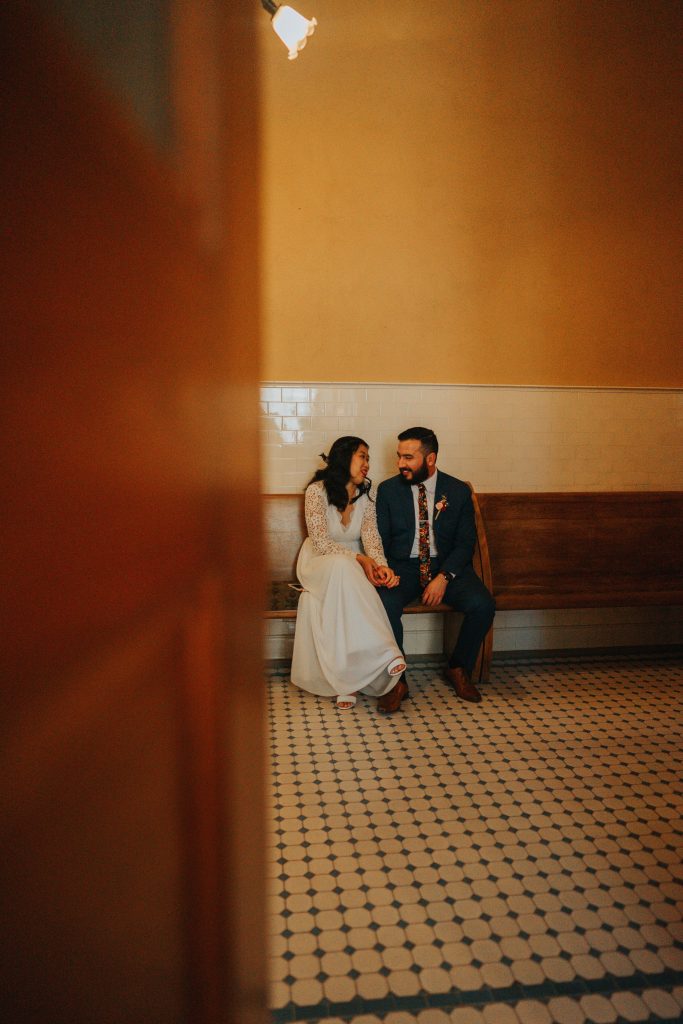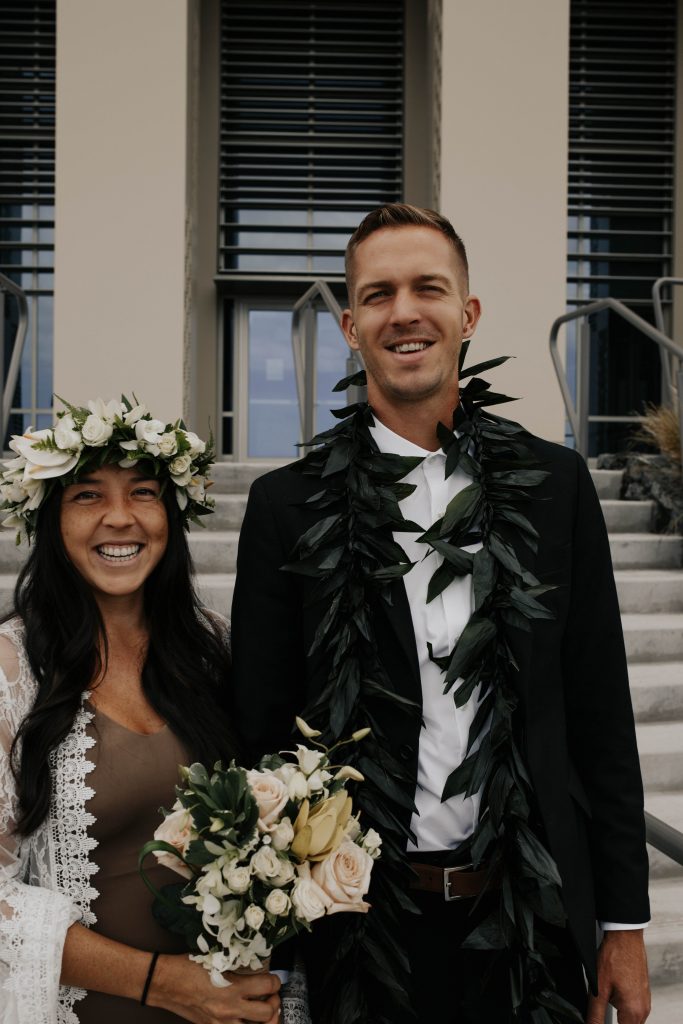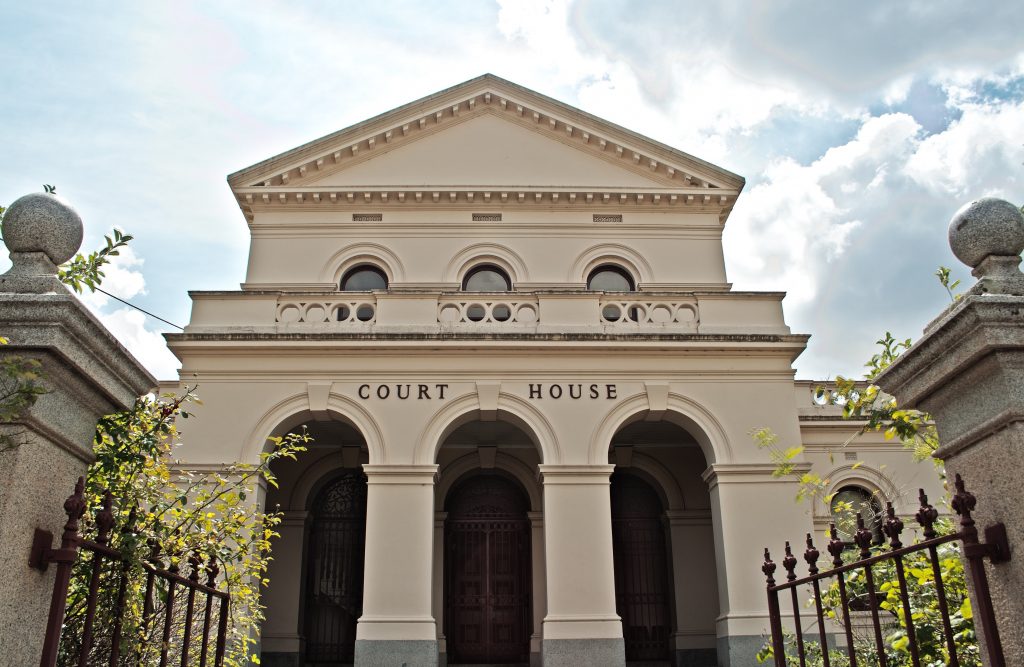
Courthouse weddings are becoming more popular each day. Less cost and pomp are just some of the reasons many couples decide to get married in a courthouse. Many partners are wondering, though: how long is a courthouse wedding anyway?
Courthouse weddings last up to 10 minutes max. These weddings last a little longer if you include the waiting time before the official ceremony, which is usually 30 minutes. All in all, courthouse weddings are conducted in just a few minutes.
In this article, I’ll explain why courthouse weddings are so short and for how long you usually need to plan one. I’ll also mention some things you should know before you have your own courthouse ceremony.
Why Courthouse Weddings Are So Short
Unlike expensive wedding ceremonies in religious institutions, such as a Church, that can take hours, courthouse weddings are more informal, take less time, and are super cheap.
By the way, if you’re interested in Church weddings and the duration of ceremonies there, you might want to take a look at my other article about how long a Church ceremony is.
So, why exactly are courthouse weddings so short?
The primary reason is that you’re almost never the only couple waiting to be married there on that day. Officiants who perform courthouse weddings (usually judges) run a tight schedule and don’t have the time to spend on individual couples.
Therefore, ceremonies in courthouse weddings are extremely short and informal. First, an officiant goes through the speech they prepared. Then the couple has the opportunity to say their vows (which aren’t that long). After that, the officiant continues with the ceremony by having the partners place rings on each other’s fingers, and that’s it! You’re married!
So, the whole ceremony part lasts about five minutes total but can go up to ten minutes.
How Long Does It Take to Plan a Courthouse Wedding?
Courthouse weddings don’t take nearly as long as more traditional weddings, where you usually spend months planning. Instead, you can plan a complete courthouse wedding in a matter of days.
That’s why courthouse weddings are a popular choice for anti-weddings. If you want to learn more about cheap and simple weddings, check my article about anti-weddings, and if you’re already in the process of planning a last-minute wedding, here’s my article on how to plan one in just a few months or days.
Although courthouse weddings are super easy to plan and execute, it doesn’t mean you can do one on a whim, as many eloped couples discovered. That’s because there’s a bureaucratic procedure before the ceremony itself.
You need to prepare some paperwork which may take you a few days. On top of that, you usually need to wait a predetermined length of time after you receive a marriage license to have an actual courthouse ceremony. The amount of time varies by state. So check out your local laws before booking the appointment.
Another reason you want to plan at least some weeks before your courthouse wedding is the available dates of your local city hall or courthouse. Some states allow you to get married immediately after you have your marriage license, while other states, counties, and cities need to find the available time for your wedding to take place.
As you can see, planning a courthouse wedding revolves more around paperwork and available appointments than financial concerns or guests’ availability.

What You Need To Know Before Your Courthouse Wedding
There are some common things every couple should know before their special day and courthouse ceremony:
- Courthouse weddings are held during workdays: Whereas traditional weddings are generally held on Fridays and weekends, courthouse weddings are held during workdays. Some counties and cities will accept your request for a weekend ceremony but usually at a higher cost.
- Ceremonies are small and simple: When planning a courthouse wedding, don’t include a large number of guests. Ceremonies are usually simple and straightforward. Because everything needs to move quickly, many guests would only disturb the process, so it’s best just to have a few friends or family members.
- You must have the necessary paperwork: To have a ceremony, you need to provide the necessary paperwork, which can vary for states, counties, and cities. However, you usually need to have your ID documentation, birth certificate, and marriage license. The license alone can delay the ceremony for up to three days.
- You usually need two witnesses: Although this requirement varies depending on different states, counties, or cities, in most cases, you need two witnesses (in some cases one) in your courthouse ceremony. Witnesses are usually your best friends or family members.
- You need to appoint it in advance: As I already mentioned, courthouses and city halls receive hundreds of marriage requests every month, so you can’t just walk in and demand to be wed. Since appointments aren’t the same everywhere, it’s best you visit the courthouse or city hall where you want to have a wedding ceremony and check their policies for the waiting list.
- Fees are involved: Courthouse weddings are cheap but not free of charge, so you’ll need to prepare some cash for your ceremony. Like almost anything with courthouse weddings, fees aren’t the same everywhere, so you’ll want to reach out to the courthouse’s web page for information. Fees can range from $24 to $115, depending on the state.
- Stay in touch with the courthouse or city hall: I can’t stress this enough. As soon as you make a request for a courthouse wedding, be constantly in touch with the staff there. You’ll have countless questions about the procedure and a lot of paperwork to get done before your official ceremony. Not to mention questions regarding fees and dos and don’ts.
- Arrive at least 30 minutes before the ceremony: Even though the ceremony lasts about 10 minutes, you’re always advised to be there 30 minutes to an hour before your scheduled ceremony or before all the ceremonies take place. This ensures you won’t be late to your ceremony, thus delaying everybody else after you.
- You can still have a reception: Just because you had a courthouse wedding doesn’t mean you can’t have a larger reception or a party for all your friends and relatives who couldn’t be at the ceremony. If you have some money to spend, by all means, create a memorable occasion for everyone.

Pros and Cons of A Courthouse Wedding
If you’re considering a courthouse wedding, here are some of the common pros and cons I found from talking to other brides and grooms about their experiences.
- Pro – courthouse weddings are quick to plan
- Pro – weddings at a courthouse are less expensive
- Pro – less pomp and circumstance with fewer guests
- Pro – more intimate ceremony
- Pro – you can celebrate with post-elopement ceremony after
- Pro – beating the wedding industrial complex and reverting to simpler traditions
- Con – limited guest list
- Con – ceremony and reception can’t happen in the same place
- Con – red tape of scheduling and waiting for a permit (see above)
- Con – possible lack of date choices
- Con – sharing your space with other couples
- Con – “rushed”, impersonal ceremony
- Con – you can’t choose who marries you or what they say
- Pro or Con – no religious elements
I haven’t been to a courthouse wedding myself but I know a few couples who had one. Years later their stories are still romantic. And they have amazing memories of their wedding days as well as every day married thereafter.
If you’re not afraid of the cons above, consider a courthouse wedding as an intimate way to get married quickly, efficiently and wallet-friendly. Need help budgeting for your wedding?
You can check out my free budget guide if you sign up for my newsletter. It automatically calculates what you should spend where based on your budget and guest count and helps you stay on track. It’s like the fairy godmother of numbers.
Conclusion
If you’re not a big fan of long traditional wedding ceremonies and spending tons of money, then a courthouse wedding might be perfect for you. They usually last up to 10 minutes and don’t require huge fees or a long guest list.
Before you decide on a courthouse ceremony, however, you should keep in mind that:
- You need to make an appointment.
- Prepare all the paperwork in advance.
- Bring two witnesses just in case.
- Keep in touch with your local city hall for information.

